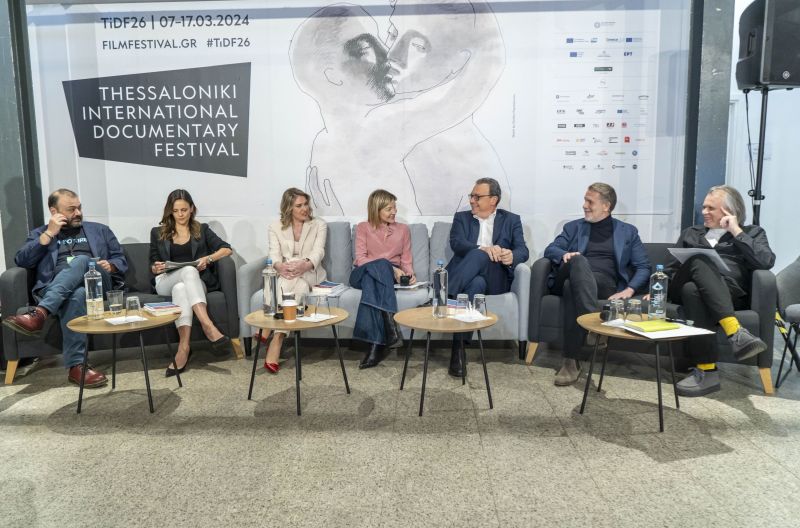Within the framework of the 26th Thessaloniki International Documentary Festival’s tribute for the 50th anniversary since the Restoration of Democracy in Greece, an open discussion featuring high-esteemed members of the Greek Parliament (ministers and MPs) took place on Saturday March 16th, on the occasion of the presentation of the book “Half a Century of Elections: Discussing the Contests of the Metapolitefsi” (Polis publishing house), edited by political analyst, Petros Ioannidis, and political scientist, Elias Tsaousakis.
The main speakers in the open discussion were the two editors of the publication as well as: Anna Efthymiou Member of Parliament for New Democracy Thessaloniki A, Sokratis Famellos, President of the SYRIZA Parliamentary Group, former Minister, Member of Parliament Thessaloniki B, Pavlos Geroulanos, Member of Parliament for PASOK Athens A, former Minister and Effie Achtsioglou Member of Parliament for NEA ARISTERA Athens B2 Constituency (West), former Minister. The discussion was moderated by journalist Rania Tzima.
Initially, the Festival’s artistic director, Orestis Andreadakis, welcomed the audience, stating that the tribute to Democracy will continue at the Thessaloniki Film Festival, in November, and at the Evia Film Project, in July 2024. Before giving the floor to Rania Tzima, he noted that “art and cinema are political acts.”
Rania Tzima expressed her joy to be in the city of Thessaloniki and to see many people of the city sharing the same concerns about how the narrative of the Metapolitefsi era still affects us and how we will take the next step.
Elias Tsaousakis thanked the speakers and the Festival, particularly Orestis Andreadakis and Elise Jalladeau, saying, among other things: "I thank all those working in the Festival, who are an integral part of a success that is not only related to the artistic part. The Festival is characterized by empathy, an open ear, profound democracy and the power to be constantly present for what is happening in society, in a calm and meaningful manner. In this context of the Festival’s constant search, it is dedicating this tribute to the 50th anniversary since the Restoration of Democracy and that's exactly where our book comes in. We are talking about half a century of uninterrupted electoral history, with no doubts or breaks in-between. We document the assessment of the period, this period of great contradictions, with 17 stories from 17 different elections."
Petros Ioannidis stressed: “Our idea for the book, shortly after its birth, was passed on to our late professor Ilias Nikolakopoulos and we thought of doing a podcast of a series of discussions with very important political analysts of our country. Unfortunately, in the process we lost Ilias Nikolakopoulos, a blow to political science. The inspiration was a show of his about the 2012 elections." He then spoke briefly about the elections mentioned in the book that make up the thread of Metapolitefsi.
Afterwards, Rania Tzima put forth the question "What is the Metapolitefsi, anyway?” asking each speaker to refer to a specific election of Metapolitefsi. Anna Efthymiou spoke about the 1974 and 1977 elections, Sokratis Famellos about the election of 2012, Pavlos Geroulanos linked the 1977 and 1981 elections while Efi Achtsioglou analyzed the 2015 election.
Anna Efthymiou emphasized: “I would like to thank the Festival, a beacon of culture for our city that offers promise and hope to the new generation. This book is worth reading for everyone as it creates a political diary with depth and substance, with an almost cinematic flow. The analysis of all the scholars is excellent and reminds us of the late Ilias Nikolakopoulos, who was synonymous with elections. The book is a useful and indispensable political tool. It analyzes political dilemmas and addresses party slogans that have raised generations."
Next, Sokratis Famellos thanked the Festival, particularly the General Director, Elise Jalladeau, for the answer she gave to the Metropolitan Bishop of Thessaloniki, Filotheos, and added: "This fine book has a very important and useful impact, it made me remember a lot of things, also in terms of electoral history, Ilias Nikolakopoulos, himself. Why were we all waiting for him to provide his commentary? Because he had competence, credibility and an ethical approach to interpreting things.”
The floor was taken then by Pavlos Geroulanos, who mentioned among others: "The book is excellent with editors knowledgeable in election strategy. If the book reveals anything about our past, it casts a greater shadow over our present. The book is an exercise in how we view the post-war era. I am missing only one chapter, written by the editors, titled ‘what we understood’, i.e. what we keep from the Metapolitefsi and what we leave behind. The prevailing themes in the book are democracy, economy, and how a state functions. All of the contemporary social issues, such as education, environment, culture, are all extras to the bigger ones.”
Finally, Efi Achtsioglou took the floor, stating among other matters: “I would say the question ‘what Metapolitefsi is’ could be answered by the word ‘democratization,’ which is two things; parliamentary democracy and proper democracy. Greater equality and more social rights imbuing Democracy with substantial content. The book’s great contribution is that it sees the social demands, links them to international developments, following in Nikolakopoulos’ footsteps.”
Wrapping up the event, Rania Tzima proposed to resume the debate after the end of the following electoral campaigns in order to create the following elections’ podcast.















